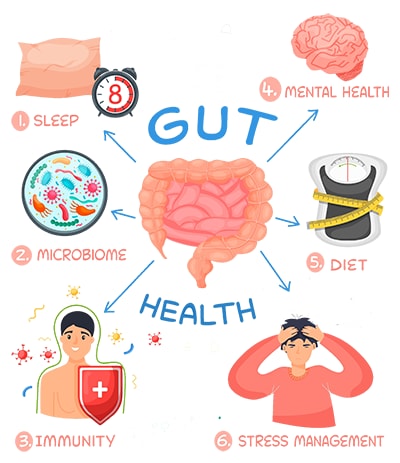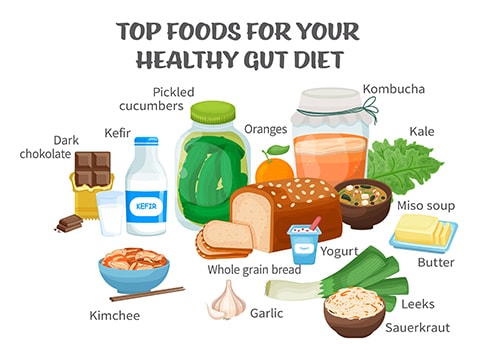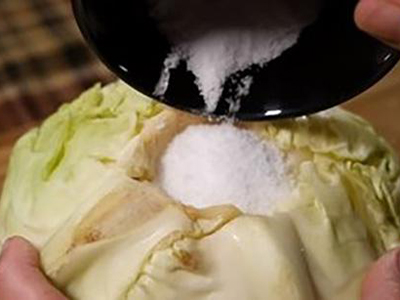
Gut Health Cheat Sheet
Dietary fiber, prebiotics, and probiotics are the first things that come to mind as far as gut health is concerned. The goal of these food ingredients is to feed the good bacteria in the stomach for the whole body to benefit. A thriving gut microbiome is the foundation of a good heart, brain, and immune system, among others. But let’s see other helpful tips & tricks for gut health in this article.
How to Tell If Your Gut is Unbalanced
Frequent tummy problems from diarrhea, constipation, bloating, and reflux are fair indications of an unhealthy digestive system.
Unknown to many, an imbalanced gut can also show other signs that are not necessarily centered in the stomach.
Some people have suppressed immunity and always end up sick, especially during the season of contagious diseases. Autoimmune disease can also develop.
Fatigue, mood swings, anxiety and depression can also occur. These symptoms are often less likely thought to be related to gut health. But, these conditions often show there is an imbalance of the gut flora.
What to Avoid
Eating the right food maintains the gut flora, but introducing the harmful ones could disrupt their balance. Although not totally avoidable, you need to limit your intake of the following foods:
- Processed foods
- Refined sugar
- Gluten especially in people with celiac disease or sensitivity
- Dairy products (natural and unflavored yogurt is good)
- Fried foods
- Red meat and non-organic meat
- Carbonated drinks
- Artificially flavored and colored foods
Coffee is debatable when it comes to gut health. Coffee is a natural antioxidant and may help stimulate the colon to eliminate waste fast. However, it may also disrupt sleep, cause heartburn and overstimulate the intestines.
⇒ Add This Herb to Coffee or Tea, to Effortlessly and Fully Empty Your Bowels Every Single Morning (Video)
The best way of taking coffee in support of gut health is taking it in moderation. A hot cup in the morning is a great start. But, do not take more than four cups a day and do not take it late in the afternoon.
Gut Health Support That Is Not Food
Digestive health is not only about food and water. Your lifestyle greatly affects how your body works.
Stress is one of the most harmful factors that can affect the body in various ways. It also has lingering effects on gut health. Here are a few more things to do to prevent stressors from affecting the digestive system.
Practice Mindful Breathing
Breathing does help with gastrointestinal problems by inducing deep relaxation. As the whole body rests, it acts like a gentle massage for the internal organs.
To do this, just find a peaceful corner to sit in. Breathe naturally and focus your attention on exhaling, feeling the sensation of tension draining from your body.
Get Quality Sleep
Spend less time with electronic devices, especially before going to bed to achieve a full night of rest. Sleep influences the growth and balance of bacteria in the gut although researchers are only starting to find out how. That’s probably because good quality sleep reduces stress and controls the hormones that trigger the craving for unhealthy foods.
The Ultimate Gut Health Cheat Sheet
Eating is necessary for survival, but clean eating is crucial for living a good quality life. Let this cheat sheet help you decide what foods to eat and what to avoid to promote a healthy gut.
What to Take
Probiotics
Probiotics are good bacteria that restore the composition of the gut microbiome. These live microorganisms help with intestinal inflammation and other systemic diseases. Probiotics are found in fermented food such as sauerkraut, pickles, kimchi, tempeh, miso and kombucha. It is also found in cultured yogurt.
Prebiotics
Prebiotics are different from probiotics. While the latter is composed of live microorganisms, prebiotics are mostly high-fiber foods that feed those microorganisms. The prebiotics are naturally contained in vegetables, fruits and legumes. Oats, bananas, berries, garlic, leeks, flaxseeds and seaweeds are just a few prebiotics sources.
Steamed Vegetables
Leafy greens, carrots and all types of vegetables are gut-supportive. They contain varied and distinct nutrients that are critical for the body’s health. Vegetables are also a rich source of dietary fibers, water and polyphenols. Polyphenols are the compounds that modulate the gut microbiota and protect the gastrointestinal tract.
The best vegetables to eat are spinach, asparagus, leeks, cruciferous vegetables, mushrooms, green peas, etc.
Fruits
Fruits are also a rich source of fiber, vitamins, minerals and polyphenols. They promote healthy digestion by stimulating the growth of beneficial microorganisms. Berries, citrus fruits, avocado, apples, bananas and pomegranates are just a few of the gut-supportive fruits you can snack on.
Herbal Teas
Starting your day with herbal teas such as green tea, black tea or oolong tea can help in the safe cleansing of the gut. Teas, especially green tea, are rich in antioxidants that flush free radicals, decrease starch absorption and improve digestion and metabolism.
Peppermint or ginger tea before bedtime also helps not just with digestion but also in encouraging quality sleep.
Additionally, this Balanced Gut Tincture contains six anti-inflammatory and soothing herbs that help repair the intestinal tract and restore healthy gut function.
Water and Juices
Hydration is important not only for gut health but for overall body wellness. Taking half a glass of water before a meal is important in easing the digestion process. Water an hour after the meal gives the body time to absorb the nutrients from food.
If possible avoid drinking water during a meal, or too soon after it. Doing this will only dilute the digestive juices and prolong the digestion.
Drinking fruit juices like lemonade is also a great help but don’t overdo it. Lemon juice can trigger heartburn and other juices may be high in sugars.
Fatty Acids
Fatty acids are beneficial in the prevention and reduction of gut inflammation. Omega-3 fatty acids found in fishes, nuts, seeds and healthy oils are effective against digestive problems. It may help in treating irritable bowel syndrome, Crohn’s disease and ulcerative colitis.
Consuming 3 grams of fatty acids daily can improve heart and digestive health. It is equivalent to taking two servings of 3-4 ounces of fish as a part of a healthy diet in a week.
AM to PM Cheat Sheet Sample
Here’s a cheat sheet you can do for a day. You can modify this sample using the above-mentioned section as a guide. Don’t forget to drink plenty of water throughout the day to power up the bodily processes.
5-7 am: Have a cup of tea (green tea, black, oolong).
7- 9 am: Whole grain porridge, oats or other gluten-free grains.
12-1 pm: Lunch of vegetables with lean meat or seafood, and fermented foods.
1-5 pm: Enjoy some fruits, nuts and seeds for snacks with a cup of herbal tea. I prefer ginger.
5-6 pm: Steamed vegetables, seafood, or boiled eggs.
Onwards: Drink a gut-soothing tea such as peppermint tea. (Take tea two hours before bedtime).
I hope these gut health tips & tricks are helpful to you. Let me know in the comments what other useful tips do you know.




When you say eat yogurt, what kind because you say don’t consume dairy? Also keifer? Also, my valve in my esophagus/stomach that opens and closes so reflux doesn’t come up isn’t working, is there a way to heal that? Desperate for help please anyone???
Betaine Hydrochloride with Pepsin and Gentian Bitters. It’s available from Amazon. It works really well.
Agreed. I have mixed feelings about yogurt. Eating yogurt was recommended by gastro for the probiotic aspect. Yet eating yogurt is frowned upon because it’s dairy. So I quit eating yogurt years ago. I haven’t consumed cow milk in several years. I tried almond and oats milk but gave them up as well due to the controversy. I do eat cheese and do fine. I don’t know!
As we age our ability to process dairy dwindles, especially if one stops using it. The only trouble with Oat milk, almond milk is the gums they add to those products. The gums do just that; gum up the works. Dairy has good proteins in it the lactose is what can cause the problem.
You can use goat milk and make your own yogurt. It’s easy to make, I use a dehydrator, but you don’t need one. You can also make yogurt w coconut milk and apparently any other “milk” like oat or almond. I wouldn’t buy those from the store, but you can make your own milks very easily at home, just by soaking the foods in water. Search that stuff, you’ll find a bunch of info. Soft through it of course….lots of garbage info out there. Good luck!
Yogurt, most kinds, have some probiotics in them that help with digestion. It is often recommended to eat yogurt with active probiotics when taking antibiotics to help in replacing the bacteria destroyed from the antibiotics. In terms of your reflux, have you discussed this your doctor or naturopath? They might be able to help.
I have reflux too. The big thing is small frequent meals, reduce and/or avoid fried, oily foods (alfredo, pesto), pizza etc. ( I dearly love pizza so I have it in small amounts made with less fatty and less sweet ingredients). Don’t eat 2 hours before bed. Regular meals in the morning cut way down on sweet tasting things they make you crave and eat more than you should and it increases stress and stress increases stomach acid.
I have that same problem. Would love to know as well.
There is a breath test for H-pylori. This bad bacteria is in tap water and if it ends up in your throat, the body tries to get rid of it, by increasing stomach acid four times stronger to burn it away. There are herbal remedies mentioned on this site. It is easily fixed with prescribed medications also. Hope this helps, take care!
i assume its the same issue i had with that valve not working causing heartburn. my chiropractor was able to get it working again so you should see if you can find one as it may be slightly different to me. But after a few sessions and experiences, ive learned how to correct it on myself when its not working however im NOT a chiro so wont be able to explain it very well, but it involves a combination of breathing and finger pressure between the ribcage opening at the front. it should NOT hurt, but if its done right it should gurgle and then pretty much an instant fix for heartburn. it hasnt happened in ages now. so seems to be fine.
Hey Tamara, if you want to go back to eating yogurt, don’t buy it at the store. Try to make it at home because you will get the fermentation process which is crucial to gut flora. You can find the recipe online or buy a book on how to ferment dairy. I think that will help you a lot. Best of luck😊
This is great information. I would add and clarify that gluten is a type of gum, but it is a type of gum we have had in our food chain for a very long time. The trouble is that the food industry uses gums to replace gluten and those gums have not been in our food chain and most people are allergic to these gums. The trouble with that is the gum allergy can make one react with the same symptoms as gluten allergy. The human body has a threshold of contact with allergens before it reacts with symptoms. So the introduction of gums into our food chain could very well be causing gluten allergies.
Conventionally grown wheat in the US is doused with Glyphosate. Glyphosate is extraordinarily toxic and causes so many health problems including leaky gut syndrome. It makes sense to me that glyphosate reaction/allergy is part of “gluten allergies”. Only eat organic flour!
Exactly what I need
My spouse and I suffered from HSV, herpes simplex virus for over 14 years without a possible way to get rid of it, we long had a dream life with early retirement and then, when we went to find out about the weakness, our whole world almost changed. There are so many things that can be said abt the suffering and frustration of people with herpes, we look back now and realize in many ways how lucky we were to have found Dr Okosun, a herbal doctor from africa. He was able to get rid of herpes virus totally with herbal medicine. I was BLOWN AWAY by how effective the herbal formula was. I recommend y,all suffering from drug resistance viruses and diseases to Dr okosun, for he cured me and my spouse permanently from herpes and he can cure yall too.
drokosun55. com